Theology of History
 |
 |
 |
 |
 |
 |
 |
The Roman Empire & the Church - IV
Theodora’s Evil Influence on Justinian
After Belisarius took Rome in 536, as we saw in the last article, the indignant barbarians regrouped and surrounded Rome. Then, it was Belisarius’ turn to defend the city.
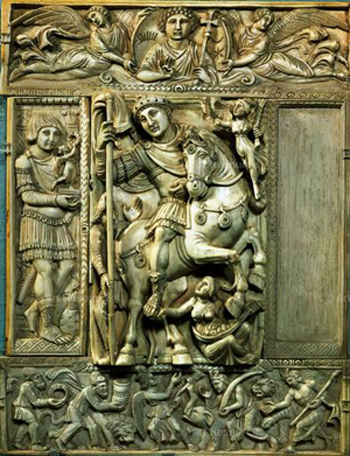 He soon realized his troops were insufficient to continue on with the campaign to regain the Peninsula. He could only hold Rome and keep a path open to the sea to allow reinforcements to arrive.
He soon realized his troops were insufficient to continue on with the campaign to regain the Peninsula. He could only hold Rome and keep a path open to the sea to allow reinforcements to arrive.
He sent Emperor Justinian a message more or less like this: “I am writing to you from Rome, but my expeditionary troops are only enough to hold the city. If you want me to continue to conquer the Peninsula, send me more men, since the corridor is open.”
Justinian understood and sent Belisarius more troops. With this, the General re-conquered the whole Italian Peninsula up to Ravenna in northern Italy, which had been capital of the Empire.
In Ravenna Belisarius took another Goth King as prisoner and sent him to Justinian, who made a new triumphal parade in Byzantium and added to his titles the name of Justinianus Gothicus.
Theodora’s intrigues against Belisarius
At this point of History I believe the intrigues of Theodora started to have their deleterious effect. Prodded by the Empress, Justinian became suspicious of Belisarius and concerned that he was gaining too much prestige and power among the soldiers.
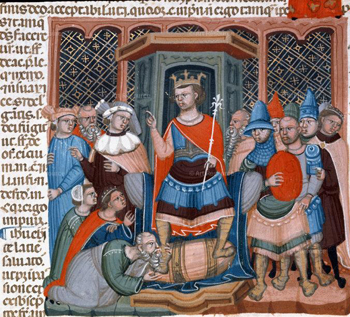 Since Belisarius needed more men to hold the conquered cities, after each new conquest he had to ask the Emperor for more troops. Instead of sending them, however, Justinian slowed down the reinforcements.
Since Belisarius needed more men to hold the conquered cities, after each new conquest he had to ask the Emperor for more troops. Instead of sending them, however, Justinian slowed down the reinforcements.
Seeing this delay, the Ostrogoth King Totila, who was a brilliant military leader, took a new offensive. After a success at Verona, Totila pursued and defeated the troops of Belisarius at the Battle of Faventia in 542, opening the way to central Italy. He followed this victory by retaking Naples and all of southern Italy. Then in 546 he surrounded Rome and re-captured the city.
Having lost the support of the Emperor and only with a remnant of his troops, Belisarius asked permission to return to Byzantium. There the Emperor dismissed him. Thus, the first initiative of Justinian to restore Catholic dominion in Italy failed.
Narses re-conquers Europe
Eight years later, a new attempt was made to re-conquer Europe. Justinian had another great general, a eunuch named Narses. He was not brilliant like Belisarius, but he was a good strategist.
Justinian gave Narses 30,000 troops - for the entire African campaign Belisarius had received only 6,000 - and sent him to Italy. Narses smashed the barbarians in Umbria and went on to destroy the Goth hordes at the Battle of Taginae in 552, where King Totila died. In 553 the last barbarians were defeated by Narses at Mons Lactarius. With this, Roman dominion returned to all of Italy.
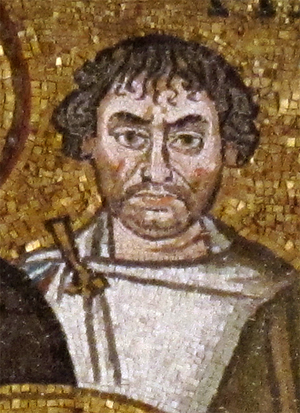 Once again the Eastern Emperor then governed the Empires of the East and the West.
Once again the Eastern Emperor then governed the Empires of the East and the West.
With this work accomplished, Justinian soon saw the opportunity to conquer Spain and reunify another territory that had been part of the old Roman Empire. The Visigoth King Atanagildo, struggling with internal wars with other Gothic kings, asked the support of Justinian. The Emperor sent a fleet that took all of southern Spain - Cartagena, Malaga, Murcia and Cordoba.
Justinian signed a peace treaty with Atanagildo, recognizing the latter as governor of that territory. Atanagildo cultivated good relations with the Franks and arranged marriages for his two daughters with two Frankish kings, Chilperic of Neustria and Sigebert of Austrasia.
At this point in History, the Catholic Eastern Roman Empire had full dominion over the East, north Africa, Italy and part of Spain. Gaul was dominated by the Catholic Franks, but the Eastern Empire also exercised considerable influence there since Clovis recognized Justinian as Emperor. Thus, Catholic dominion over a large part of Europe was again restored.
Theodora induces Justinian to favor heresies
But Theodora was not content with those triumphs. She insisted that all those conquests were of no worth; they were triumphs over nothing but hillbillies. What was important, she sustained, was to conquer Asia. To do that, a new policy should be adopted.
She convinced the Emperor that first he must start to win the good will of the Eastern peoples who were already under his dominion, but harbored ill will toward him. Those countries were Syria and Egypt. Their antagonism stemmed from the fact that on the whole they adhered strongly to the Monophysitist heresy.
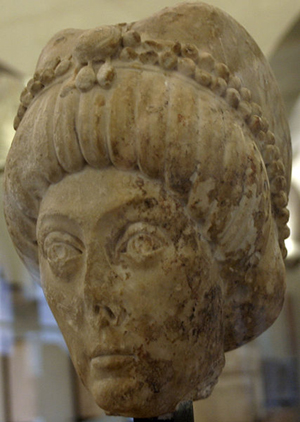 This heresy admitted only the divine nature in Our Lord, and not His human nature. The heretical sect had been able to spread broadly because Justinian was not fighting for the Catholic Faith in those areas. Theodora had convinced him that this was not convenient for the welfare of the Empire.
This heresy admitted only the divine nature in Our Lord, and not His human nature. The heretical sect had been able to spread broadly because Justinian was not fighting for the Catholic Faith in those areas. Theodora had convinced him that this was not convenient for the welfare of the Empire.
She advised Justinian to leave aside the Catholic cause and give liberty to the monophysitists of Syria and Egypt to strengthen their alliance with the Empire. This would allow Justinian to enter the East and conquer Persia and Babylonia, thus building a much greater empire.
Theodora’s ascendancy over Justinian was increasing, and so he started to favor the monophysitists. The heresy even entered the West when the heretic Severus, who represented a branch of Monophysitism called Miaphysitism, assumed great influence over Theodora and maneuvered to have his sect recognized. This occurred in 543 during Justinian’s campaign’s to re-conquer Europe.
Shortly afterwards, under the influence of the Empress, Justinian deposed the legitimate Pope, Pope Silverius, whom he considered to be “too intransigent,” and replaced him with an anti-pope. With this action, he broke with the Roman Catholic Church.
After those great victories in the West, the Empire tried to expand in Asia, but encountered multiple difficulties and complications. Justinian withdrew his troops from Europe to deal with those problems. But he did not succeed in Asia. Meanwhile, in the Balkans, the barbarians again regrouped and showed increasing signs of unrest.
When Justinian died, all his work of re-conquering Europe was deeply jeopardized, and Asia remained unconquered.
His successor, Justin, was a weak man and ruler. Under his Empire, the barbarians started to retake what they had lost. The greater part of Italy would be lost to the invading Lombards three years after Justinian’s death (568). In 40 more years the newly founded Spanish province would be completely recovered by the Spanish Visigoths. And within a century and a half Africa would be forever lost to the Empire in the Muslim conquests.
Thanks to Theodora, the Eastern Roman Empire returned to the point where it was before Justinian: filled with heresies and threatened by the barbarians.
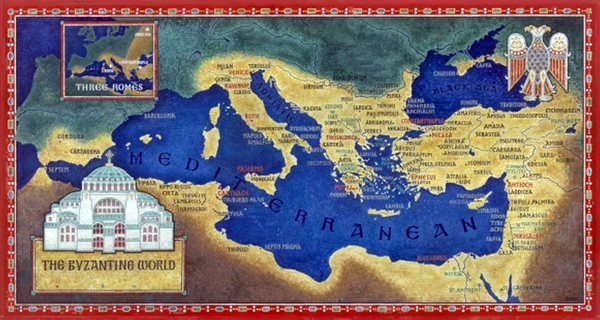


A 6th century ivory diptych of Justinian dominating the barbarians
He sent Emperor Justinian a message more or less like this: “I am writing to you from Rome, but my expeditionary troops are only enough to hold the city. If you want me to continue to conquer the Peninsula, send me more men, since the corridor is open.”
Justinian understood and sent Belisarius more troops. With this, the General re-conquered the whole Italian Peninsula up to Ravenna in northern Italy, which had been capital of the Empire.
In Ravenna Belisarius took another Goth King as prisoner and sent him to Justinian, who made a new triumphal parade in Byzantium and added to his titles the name of Justinianus Gothicus.
Theodora’s intrigues against Belisarius
At this point of History I believe the intrigues of Theodora started to have their deleterious effect. Prodded by the Empress, Justinian became suspicious of Belisarius and concerned that he was gaining too much prestige and power among the soldiers.

Theodora used her influence to introduce the Monophysitist heresy in the court
Seeing this delay, the Ostrogoth King Totila, who was a brilliant military leader, took a new offensive. After a success at Verona, Totila pursued and defeated the troops of Belisarius at the Battle of Faventia in 542, opening the way to central Italy. He followed this victory by retaking Naples and all of southern Italy. Then in 546 he surrounded Rome and re-captured the city.
Having lost the support of the Emperor and only with a remnant of his troops, Belisarius asked permission to return to Byzantium. There the Emperor dismissed him. Thus, the first initiative of Justinian to restore Catholic dominion in Italy failed.
Narses re-conquers Europe
Eight years later, a new attempt was made to re-conquer Europe. Justinian had another great general, a eunuch named Narses. He was not brilliant like Belisarius, but he was a good strategist.
Justinian gave Narses 30,000 troops - for the entire African campaign Belisarius had received only 6,000 - and sent him to Italy. Narses smashed the barbarians in Umbria and went on to destroy the Goth hordes at the Battle of Taginae in 552, where King Totila died. In 553 the last barbarians were defeated by Narses at Mons Lactarius. With this, Roman dominion returned to all of Italy.

General Narses, from the Ravenna mosaic
With this work accomplished, Justinian soon saw the opportunity to conquer Spain and reunify another territory that had been part of the old Roman Empire. The Visigoth King Atanagildo, struggling with internal wars with other Gothic kings, asked the support of Justinian. The Emperor sent a fleet that took all of southern Spain - Cartagena, Malaga, Murcia and Cordoba.
Justinian signed a peace treaty with Atanagildo, recognizing the latter as governor of that territory. Atanagildo cultivated good relations with the Franks and arranged marriages for his two daughters with two Frankish kings, Chilperic of Neustria and Sigebert of Austrasia.
At this point in History, the Catholic Eastern Roman Empire had full dominion over the East, north Africa, Italy and part of Spain. Gaul was dominated by the Catholic Franks, but the Eastern Empire also exercised considerable influence there since Clovis recognized Justinian as Emperor. Thus, Catholic dominion over a large part of Europe was again restored.
Theodora induces Justinian to favor heresies
But Theodora was not content with those triumphs. She insisted that all those conquests were of no worth; they were triumphs over nothing but hillbillies. What was important, she sustained, was to conquer Asia. To do that, a new policy should be adopted.
She convinced the Emperor that first he must start to win the good will of the Eastern peoples who were already under his dominion, but harbored ill will toward him. Those countries were Syria and Egypt. Their antagonism stemmed from the fact that on the whole they adhered strongly to the Monophysitist heresy.

An 8th century bust of the Empress Theodora
She advised Justinian to leave aside the Catholic cause and give liberty to the monophysitists of Syria and Egypt to strengthen their alliance with the Empire. This would allow Justinian to enter the East and conquer Persia and Babylonia, thus building a much greater empire.
Theodora’s ascendancy over Justinian was increasing, and so he started to favor the monophysitists. The heresy even entered the West when the heretic Severus, who represented a branch of Monophysitism called Miaphysitism, assumed great influence over Theodora and maneuvered to have his sect recognized. This occurred in 543 during Justinian’s campaign’s to re-conquer Europe.
Shortly afterwards, under the influence of the Empress, Justinian deposed the legitimate Pope, Pope Silverius, whom he considered to be “too intransigent,” and replaced him with an anti-pope. With this action, he broke with the Roman Catholic Church.
After those great victories in the West, the Empire tried to expand in Asia, but encountered multiple difficulties and complications. Justinian withdrew his troops from Europe to deal with those problems. But he did not succeed in Asia. Meanwhile, in the Balkans, the barbarians again regrouped and showed increasing signs of unrest.
When Justinian died, all his work of re-conquering Europe was deeply jeopardized, and Asia remained unconquered.
His successor, Justin, was a weak man and ruler. Under his Empire, the barbarians started to retake what they had lost. The greater part of Italy would be lost to the invading Lombards three years after Justinian’s death (568). In 40 more years the newly founded Spanish province would be completely recovered by the Spanish Visigoths. And within a century and a half Africa would be forever lost to the Empire in the Muslim conquests.
Thanks to Theodora, the Eastern Roman Empire returned to the point where it was before Justinian: filled with heresies and threatened by the barbarians.

An artist's depiction of the Byzantium Empire under Justinian

Posted March 11, 2013
______________________
______________________











